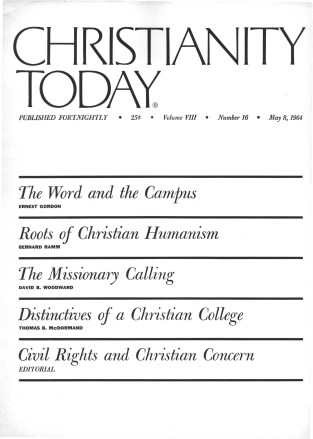Frequent repetition of a formula may secure for it an acceptance which its intrinsic value might never bring. This seems to be the case with the statement, so frequently made nowadays, that contemporary advancements in scientific exploration make it completely untenable and irrelevant to speak of a God who is either “up there” or “out there.” There is reason to think that multitudes are accepting such a contention without ever really coming to grips with the presuppositions behind it. Perhaps we do well, before we become hypnotized by the frequent repetition of such a cliché as “No God up there or out there,” to seek to discover upon what grounds the contention is made.
The theologian Paul Tillich, to whom reference is usually made in support of such a statement, seems convinced that a faith in God that rests upon any such theological presupposition as “transcendence” is doomed to disappear into the limbo of irrelevance in the light of the scientific orientation of today’s man, and before the psychological obstacles that his manner of thought places in his way. Such a claim ought not to be accepted without at least an attempt to discover whether or not the ground upon which it rests is unassailable.
When the plain man hears the wide range of explanations given in defense of the formula under discussion, and when he asks for some clear word upon which he can rest his spiritual confidence, he is confused, and wonders whether the theologian has understood his questions. If God is neither “up there” nor “out there,” then precisely where is he?
The answer that is given to him seems to be that there is a structural ground underlying all that is, and that it is in the submerged layers of deeper reality that there can be found that which corresponds to the historical concept of “God.” This assumes that there is somewhere an abysmal level that underlies our concrete existence, in which resides some metaphysical Ground of our being. This Ground defies definition; it expresses itself in myths and symbols. As objective statements, doctrines are merely pointers that seek to direct our thought to this hidden Ground of all being. But if the plain man is baffled at this, he is nevertheless assured that the term “God” is a symbol of the Unconditioned that promises to bring into resolution all the contradictions of our finite existence.
Such a form of theological thought cannot be attributed to mere perverseness: there must be a reason for it. Certainly Paul Tillich seeks to come to grips with a vast amount of data that is pushed aside as irrelevant by many theologians. But one is tempted to wonder whether he is not himself making some assumptions that are frequently kept out of sight.
There was a day in which the external vastness of the universe was a primary cause of wonderment. While the space age does command the attention of nearly all today, the more critical thinkers are intrigued by the new world of almost infinite smallness that the newer physics is opening up. The intricacy of this sub-microscopic world, together with its frighteningly great potential and its promise of offering an ultimate answer to the question of the world’s structure, causes it to be impressive. It is therefore not surprising that “the starry heavens above and the moral law within” have been compelled to move over and make room for this third source of awe. And should it prove to be true (as seems likely) that matter is simply congealed or clotted energy, then it does make some sort of sense, from one point of view, to look into this world of fantastically small structures for meaning.
What may be questioned is whether anything down in this world of Bausteine should be identified with God. There was a day in which the universe outside man came to be viewed as sufficient in itself for explanation and meaning. With the coming of the Newtonian physics, sophisticated man came to repeat the error of the primitive, who by his efforts to manipulate his environment witnesses to his basic exclusion of the living God from the world. When great strands of eighteenth and nineteenth-century scientific thinking seemed, upon the basis of examination of the structures of the universe itself, to make God irrelevant, it seemed that the mechanist had won his case.
With the discovery of the miniscule world, there came a movement, almost imperceptible at first, by which God was to be excluded from this world also. It seems now that the newer form of theology represented by Paul Tillich at the technical level, and by Bishop Robinson (notorious nowadays for his book Honest to God), may be seeking to salvage something for theology out of the wreckage of the newer scientific agnosticism. However, it remains to be shown that an identification of “God” with what is that robs him of any vital role—cither as Creator, or as Sustainer of the world, or yet as Redeemer of man—represents any substantial gain. In the process, “God” is depersonalized; he can no longer be thought to bring us under his judgment, or to demand from us personal commitment. At best he is an unknowable Ground of being, perhaps giving some intimations of his existence in the processes of my own psyche.
Thus the newer denial of a transcendent God seems to spring from three roots: first, a tribalistic desire to exclude God from effective participation in the affairs of the universe; second, a nouveau riche (and we think, gnostic) preoccupation with the new world opened up by nuclear physics; and third, the perennial desire of the natural heart to avoid the disarrangement of our human plans by One who sovereignly transcends us.










